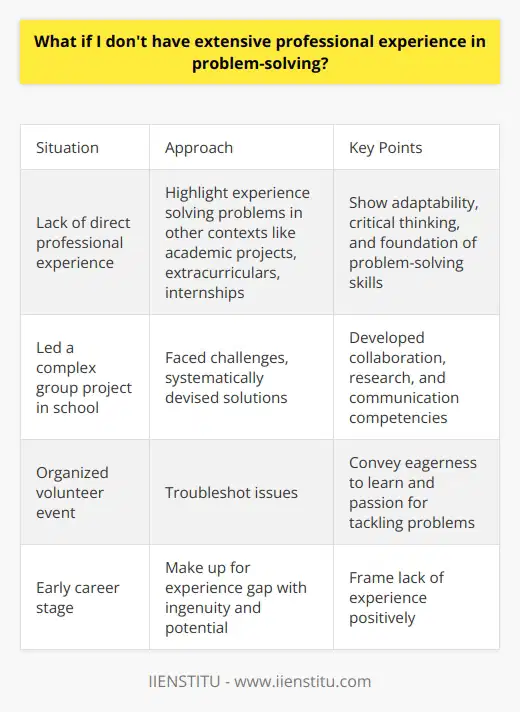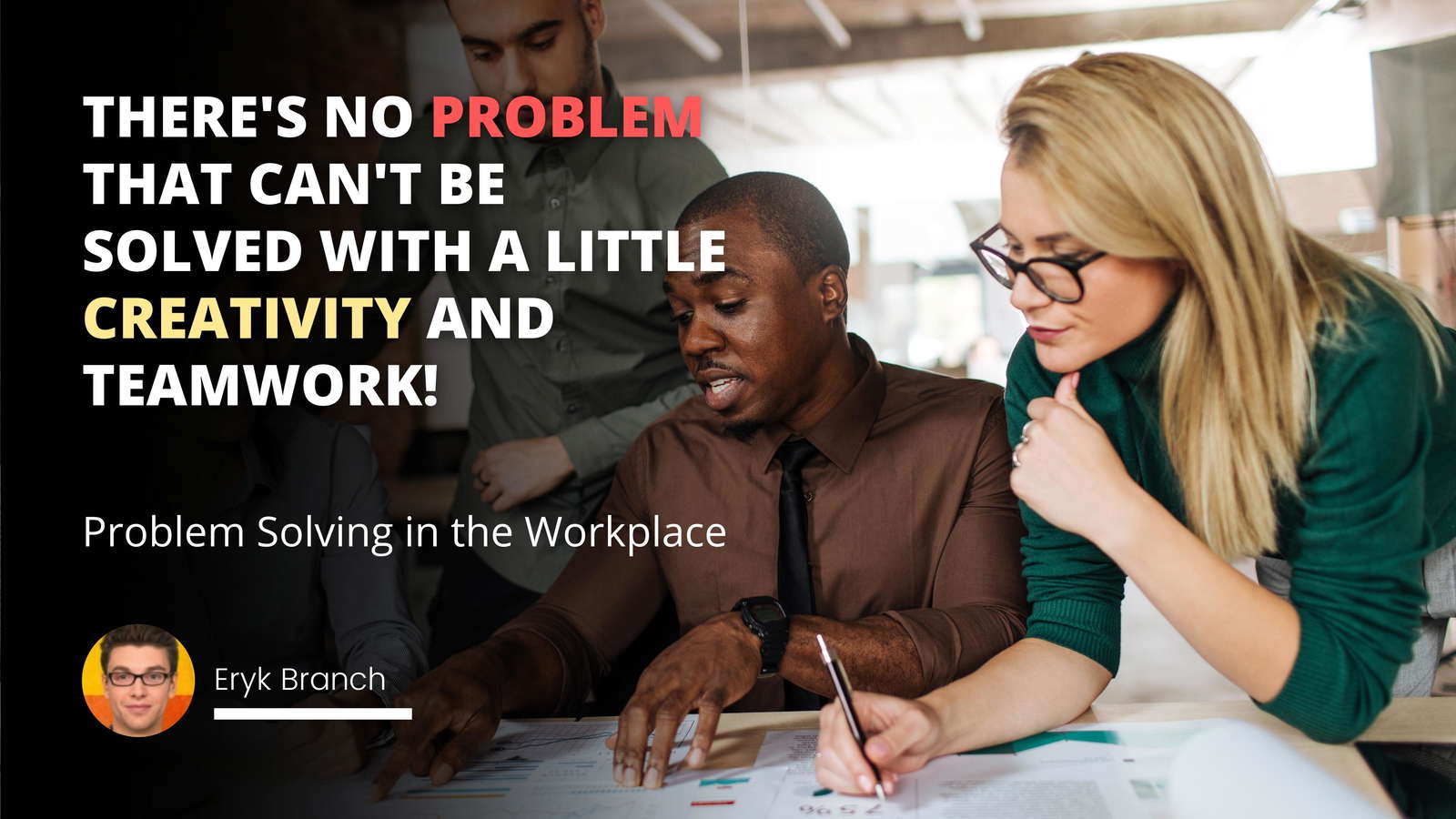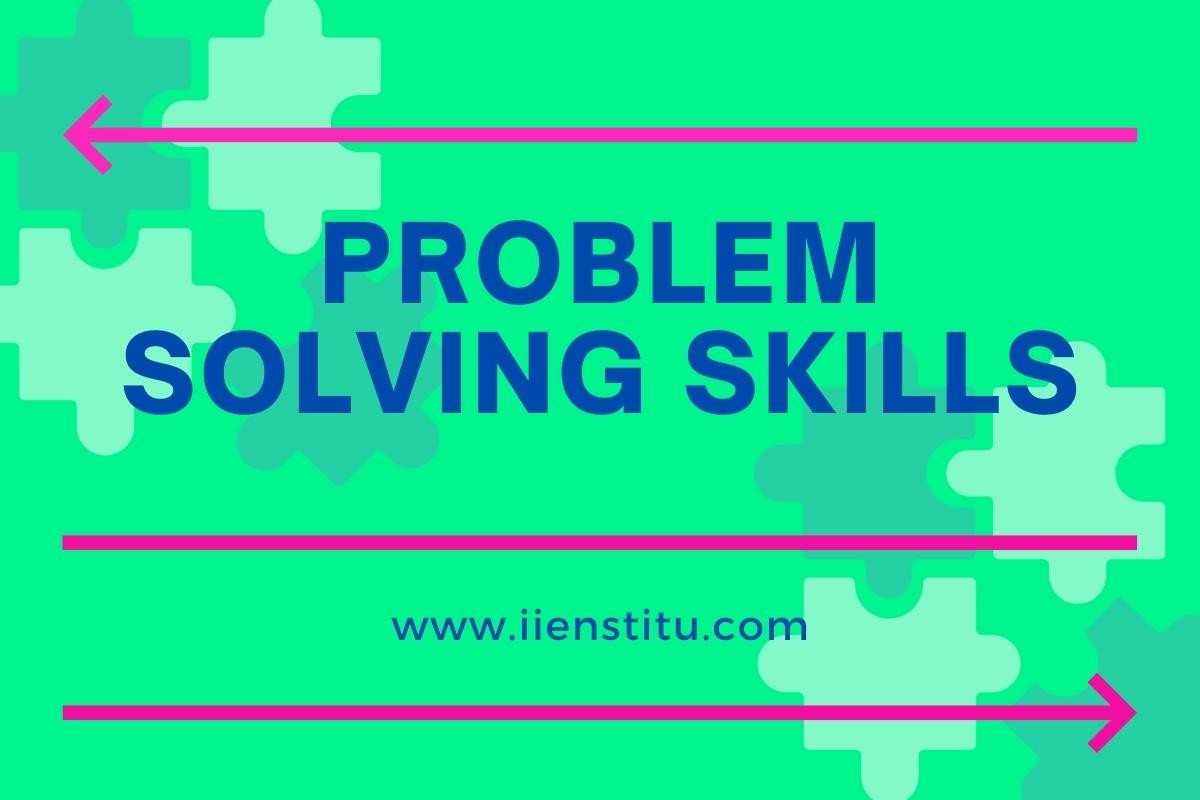
You know, there's something truly fascinating about the way life throws challenges at us. I remember back in my early career days, I thought I had it all figured out. I believed problem-solving was just about applying the right formula or following a set procedure. Boy, was I in for a surprise! Over time, I realized that improving problem-solving skills isn't just a one-off endeavor but a continuous journey of growth and learning.
Embracing the Problem-Solving Journey
Thinking back, one of the pivotal moments in my career was when I was tasked with leading a project that involved optimizing a supply chain management process. I had to come up with tips and strategies to make the process more efficient. At first, I was overwhelmed. Supply chain logistics can be a beast, and I wasn't sure where to start.
The Wake-Up Call
One evening, as I was poring over data and feeling utterly stuck, a mentor of mine dropped by my office. Noticing my frustration, he shared something that changed my perspective entirely: "Problem-solving isn't about having all the answers; it's about asking the right questions."
How To Effectively Use New Time Management Tools İn Daily Routine
Aligning Supply Chain Goals With Business Strategy İnterview Question
That hit home. I realized I needed to shift from trying to be the hero with immediate solutions to being a curious explorer of possibilities. This mindset shift was the first step in improving my problem-solving abilities.
Strategies I Adopted to Enhance My Problem-Solving Skills
1. Cultivating a Growth Mindset
I started embracing the concept of a growth mindset, a term popularized by psychologist Carol S. Dweck in her book Mindset: The New Psychology of Success. The idea is simple yet profound: our abilities can be developed through dedication and hard work.
Best Way To Answer How Do You Approach Problem Solving İnterview Question
Balancing Urgency And İmportance İn Time Management İnterview Question
Interview Question: How Do You Integrate New Time Management Tools or Apps Into Your Routine?
Understanding Motivation Letters: A Comprehensive Writing Guide
Embracing challenges instead of avoiding them.
Persisting in the face of setbacks.
Seeing effort as a path to mastery.
Learning from criticism.
Finding lessons and inspiration in the success of others.
By adopting this approach, I began to see problems not as insurmountable obstacles but as opportunities to learn and grow.
2. Enhancing Critical Thinking Skills
To tackle complex problems, I realized I needed to sharpen my critical thinking. I delved into Edward de Bono's techniques from his book Six Thinking Hats, which teaches parallel thinking and helps break down issues from multiple perspectives.
White Hat: Focusing on data and facts.
Red Hat: Considering emotions and intuitions.
Black Hat: Identifying potential problems.
Yellow Hat: Spotting the benefits and value.
Green Hat: Thinking creatively and outside the box.
Specificity: Provide concrete examples from your experiences that illustrate your problem-solving abilities. Be descriptive and detailed, showcasing the specific challenges you tackled, the actions you took, and the outcomes achieved.
Growth Mindset: Emphasize your openness to learning, adaptability, and ability to embrace new techniques and approaches. Highlight instances where you actively sought out opportunities to improve your problem-solving skills.
Collaboration: Illustrate your ability to work effectively in a team and mention scenarios where you collaborated with colleagues to solve problems collectively. Highlight your interpersonal skills and your capacity to bring diverse perspectives together for effective problem resolution.
Results-Oriented Approach: Showcase your track record of achieving positive outcomes through your problem-solving skills. Quantify your achievements where possible, highlighting any cost savings, increased productivity, or recognition received.
Continual Improvement: Communicate your commitment to ongoing growth and development in problem-solving. Discuss how you stay updated with industry trends, engage in professional development activities, and actively seek feedback to refine your approach.
Blue Hat: Managing the thinking process.
This method allowed me to dissect problems thoroughly and consider all angles before jumping to conclusions.
3. Collaborative Problem-Solving
I started involving my team more actively. I discovered that working together doesn't just distribute the workload; it brings in diverse perspectives that I might have missed on my own.
We held brainstorming sessions where no idea was too outlandish.
Encouraged open dialogue and made sure everyone felt heard.
What steps have you taken to enhance your problem-solving skills?
How has your problem-solving ability evolved over time?
In what ways have you honed your problem-solving skills?
Can you share any specific strategies or techniques you have adopted to improve problem solving?
Have you taken any courses or attended any workshops to enhance your problem-solving skills?
What efforts have you made to become a better problem solver?
How do you approach problem solving differently now compared to before?
What have you done to actively develop your problem-solving capabilities?
Have you sought feedback from others to improve your problem-solving skills?
How do you continually challenge yourself to improve problem solving?
What progress have you made in your problem-solving abilities?
Have you sought out any mentors or role models to assist in developing your problem-solving skills?
What specific examples can you provide that demonstrate your improved problem-solving capabilities?
How do you evaluate and measure your growth in problem solving?
Have you read any books or articles on problem-solving techniques? If so, how have they influenced your approach?
How have you applied your problem-solving skills to real-life situations and challenges?
What obstacles have you faced in improving your problem-solving skills, and how have you overcome them?
Can you describe any instances where you successfully solved a complex problem using your enhanced problem-solving abilities?
Have you been recognized or acknowledged for your improved problem-solving skills by others?
How have your improved problem-solving skills contributed to your overall effectiveness in your role or profession?
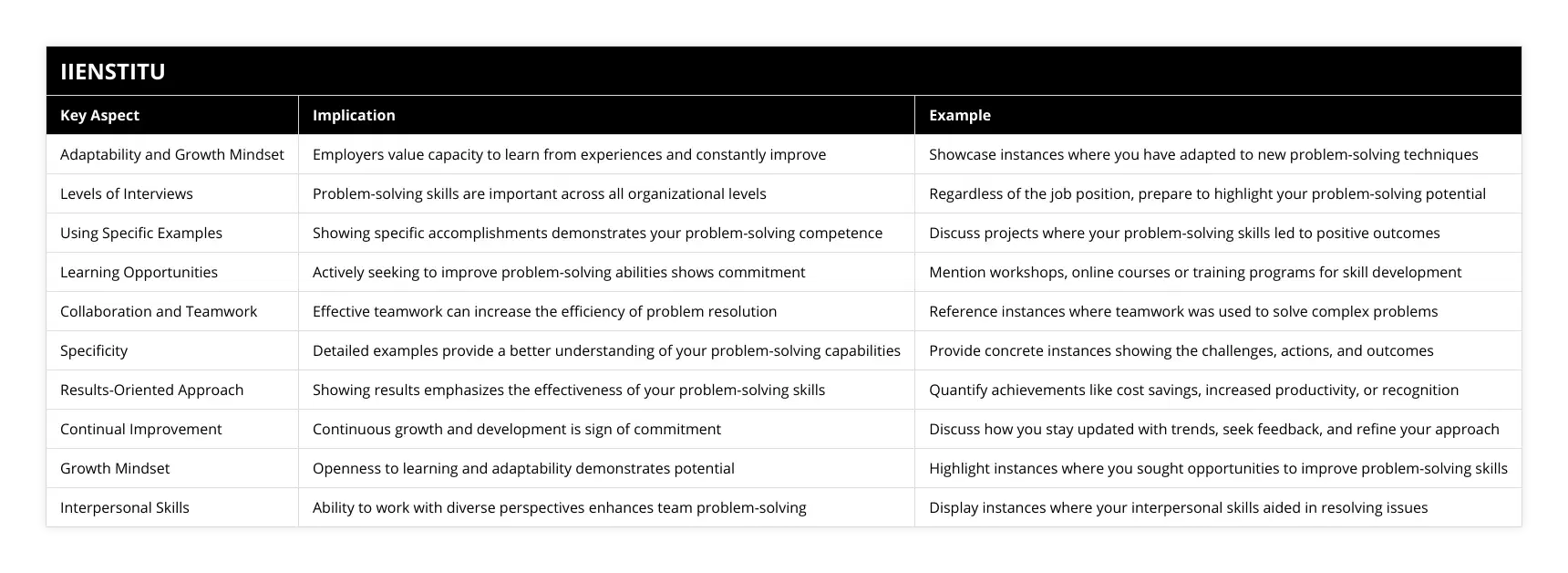
Leveraged individual strengths to address different aspects of the problem.
As a result, not only did we find more innovative solutions, but our team cohesion also improved significantly.
Real-Life Application: Overcoming Supply Chain Challenges
When faced with the task to optimize supply chain management process tips, I applied these newfound strategies.
1- Analyzed Data Thoroughly: Using the White Hat thinking, I dug deep into the logistics data to understand the bottlenecks.
2- Engaged the Team: I brought together members from procurement, logistics, and sales to get their insights.
3- Brainstormed Creative Solutions: We utilized Green Hat thinking to come up with ideas like rerouting shipments or consolidating orders.
4- Evaluated Risks and Benefits: With the Black and Yellow Hats, we assessed potential pitfalls and benefits of each idea.
5- Implemented and Monitored: Finally, we chose the most viable solutions and kept a close eye on the results, ready to adjust as needed.
The outcome? We reduced delivery times by 20% and cut costs by 15%. It was a win-win, and I couldn't have been prouder of the team's collaborative effort.
Continuous Learning and Improvement
Workshops and Courses
Realizing the value of structured learning, I enrolled in workshops like "Advanced Problem-Solving Techniques" offered by the local business institute. Additionally, I took courses on critical thinking and decision-making.
Seeking Mentorship
I sought out mentors who excelled in strategic thinking. Their guidance was invaluable. They shared their experiences, challenges, and the approaches they took to overcome obstacles.
Reflective Practice
I began maintaining a journal to reflect on problems I faced, the solutions I tried, and the outcomes.
What worked?
What didn't?
What could I do differently next time?
This practice helped me internalize lessons and avoid repeating mistakes.
Key Takeaways for Aspiring Problem Solvers
Embrace Challenges
Don't shy away from difficult situations. They are the best teachers.
Be Open to Learning
Whether it's through reading books like "The Art of Critical Decision Making" by Joseph Badaracco or attending seminars, always seek knowledge.
Collaborate Effectively
Remember, two heads are often better than one. Leverage the power of teamwork.
Reflect and Adapt
Take the time to reflect on your experiences. Be willing to adapt and change your approach as needed.
Stay Persistent
At times, solutions won't come easy. Persistence is key. Keep at it, and don't get discouraged by setbacks.
The Impact on My Professional Journey
Improving my problem-solving skills didn't just make me better at my job; it transformed the way I approach life. I became more confident in tackling new challenges and more resilient in the face of adversity.
Recognitions and Growth
Received the Employee of the Year Award for innovation in process improvement.
Promoted to a leadership position, allowing me to mentor others.
Invited to speak at industry conferences about effective problem-solving strategies.
These achievements were a direct result of my commitment to continuous improvement.
Conclusion: An Ongoing Adventure
Improving problem-solving skills is a lifelong journey, one that requires curiosity, openness, and a bit of courage. Looking back, I'm grateful for the challenges that pushed me out of my comfort zone. They've not only made me a better professional but also enriched my life in countless ways.
So, to anyone asking, "How have you improved problem-solving?" I'd say it's all about embracing the process, learning continually, and not being afraid to make mistakes along the way.
Similar Questions to Reflect On
1- What steps have you taken to enhance your problem-solving skills?
2- How has your problem-solving ability evolved over time?
3- In what ways have you honed your problem-solving skills?
4- Can you share any specific strategies or techniques you have adopted to improve problem solving?
5- Have you taken any courses or attended any workshops to enhance your problem-solving skills?
References
1- Dweck, C. S. (2006). Mindset: The New Psychology of Success. New York: Random House.
2- de Bono, E. (1985). Six Thinking Hats. New York: Little, Brown and Company.
3- Kahneman, D. (2011). Thinking, Fast and Slow. New York: Farrar, Straus and Giroux.
4- Badaracco, J. L. (2013). The Art of Critical Decision Making. Boston: Harvard Business School Press.
5- Paul, R., & Elder, L. (2014). Critical Thinking: Tools for Taking Charge of Your Professional and Personal Life. Upper Saddle River: Pearson Education.
Final Thoughts
Remember, every problem is an opportunity in disguise. By continuously improving our problem-solving skills, we not only enhance our professional capabilities but also enrich our personal lives. So keep pushing, keep learning, and don't forget to enjoy the journey!
Frequently Asked Questions
Can I provide personal examples from outside the workplace to demonstrate my problem-solving abilities?
Absolutely! Personal examples that highlight your problem-solving skills can be highly valuable during interviews. Employers are interested in your ability to tackle challenges effectively, regardless of whether they occurred in a professional or personal context. Just ensure that you can relate these examples back to the skills and attributes required for the position you're interviewing for.
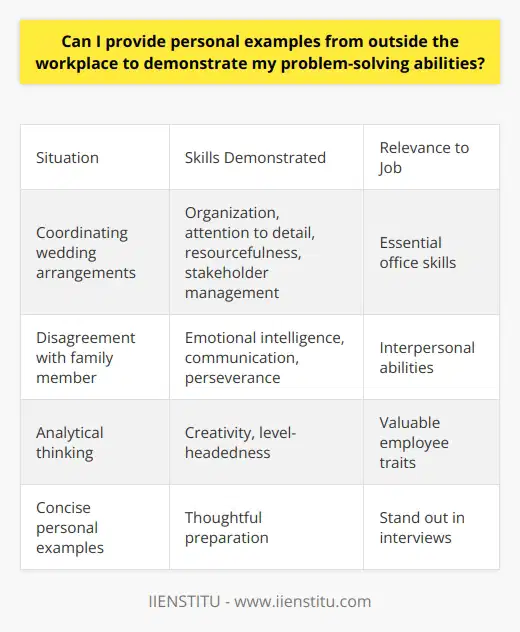
Should I focus on a single problem-solving methodology or demonstrate versatility?
Demonstrating versatility is key. While it is beneficial to highlight particular methodologies or techniques you have mastered, employers value candidates who can adapt their problem-solving approach to different scenarios. Showcase your ability to think flexibly and employ a variety of methods depending on the nature of the challenge at hand.
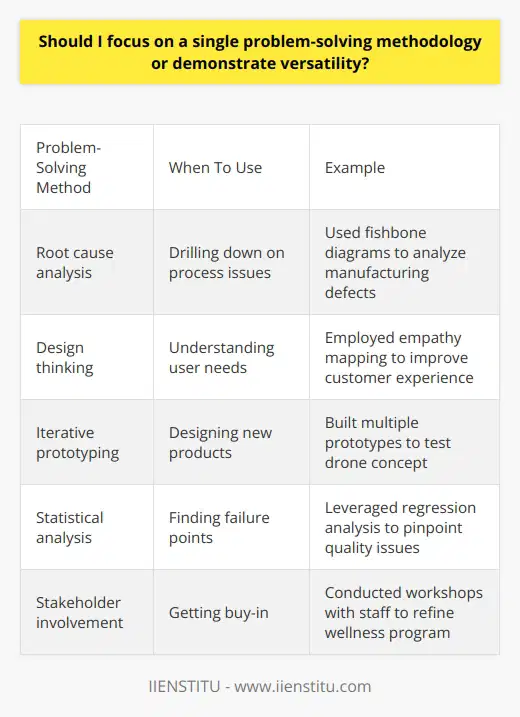
What if I don't have extensive professional experience in problem-solving?
If you lack extensive professional experience, focus on highlighting any relevant experiences from internships, volunteer work, academic projects, or extracurricular activities. Showcase your ability to apply problem-solving skills in different contexts and emphasize the lessons learned and results achieved from these experiences. Employers value your ability to transfer skills across domains.
